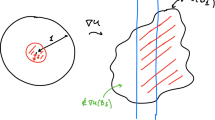Abstract
We present an alternative proof of the Mountain Pass Theorem by means of the classical Ekeland Variational Principle for a class of \({\mathcal{C}^1}\) -functionals. In this new proof we avoid the machinery of convex analysis by a simpler characterization of the critical values of the functional.
Similar content being viewed by others
References
Ambrosetti A., Rabinowitz P.H.: Dual variational methods in critical point theory and applications. J. Funct. Anal. 14, 349–381 (1973)
Aubin, J.P., Ekeland, I.: Applied nonlinear analysis, Dover Publications Inc., Mineola, NY, (2006). Reprint of the 1984 original
Birkhoff G.D.: Dynamical systems with two degree of freedom. Trans. Am. Math. Soc. 18(2), 199–300 (1917)
Coffman C.V., Ziemer W.K.: A prescribed mean curvature problem on domains without radial symmetry. SIAM J. Math. Anal. 22(4), 982–990 (1991)
Costa D.G.: An invitation to variational methods in differential equations. Birkhäuser Boston Inc., Boston (2007)
Courant, R.: Dirichlet’s principle, conformal mapping, and minimal surfaces, Springer-Verlag, New York, 1977. With an appendix by M. Schiffer; Reprint of the 1950 original
de Figueiredo, D.G.: Lectures on the Ekeland variational principle with applications and detours Tata Institute of Fundamental Research Lectures on Mathematics and Physics vol. 81. Published for the Tata Institute of Fundamental Research, Bombay
Ekeland I.: On the variational principle. J. Math. Anal. Appl. 47, 324–358 (1974)
Evans L.C.: Partial differential equations 2nd ed. Graduate Studies in Mathematics vol. 19. American Mathematical Society, Providence, RI (2010)
Folland G.B.: Realanalysis Modern techniques and their applications 2nd ed. Pure and Applied Mathematics (New York). John Wiley & Sons Inc., New York (1999)
Hiriart-Urruty J.B.: A short proof of the variational principle for approximate solutions of a minimization problem. Amer. Math. Monthly 90(3), 206–207 (1983)
Jabri Y.: The mountain pass theorem Variants, generalizations and some applications Encyclopedia of Mathematics and its Applications 95. Cambridge University Press, Cambridge (2003)
Nehari Z.: On a class of nonlinear second-order differential equations. Trans. Amer. Math. Soc. 95, 101–123 (1960)
Struwe M.: Superlinear elliptic boundary value problems with rotational symmetry. Arch. Math. (Basel) 39(3), 233–240 (1982)
Willem M.: Minimax theorems. Progress in Nonlinear Differential Equations and Their Applications 24. Birkhäuser Boston Inc., Boston, MA (1996)
Author information
Authors and Affiliations
Corresponding author
Rights and permissions
About this article
Cite this article
Montenegro, M., Presoto, A.E. An alternative proof of the mountain pass theorem for a class of functionals. J Glob Optim 57, 575–581 (2013). https://doi.org/10.1007/s10898-012-0001-6
Received:
Accepted:
Published:
Issue Date:
DOI: https://doi.org/10.1007/s10898-012-0001-6



